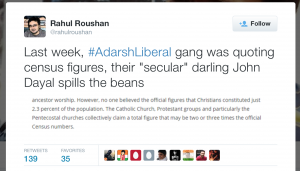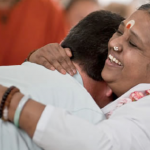As most people of Indian origin know, “American Born Confused Desi” – an ABCD – is a special phrase used to refer to a rather “neither here nor there” mentality that we Indian Americans might have acquired while growing up in America, with parents who are immigrants from India trying to provide an “Indian” environment at home. My parents went a step farther – they moved the family back to India when I was in high school, so that I could have a first hand experience of what it means to be Indian. What I really imbibed from India, particularly during college, was its pluralism. I had friends of different faiths, sampradayas, languages – all living together, freely expressing, practicing and even sharing their faith – without any intent to convert or claim superiority of one faith over another. Looking back at the number of times my Catholic roommate and I went to each others’ houses of worship, my Muslim friend and I visited each other’s homes on our respective holy days, or our Christian neighbors and my family exchanged traditional sweets for Diwali and Christmas, those years in India – and subsequent visits – allowed me to understand what living religious pluralism actually is.
Being in America and particularly a Hindu in America, I have found that being grounded in pluralism helps me balance the various aspects of my identity – not just Indian or American, but being a mother, a wife, a daughter, a community member, an employee, an activist and so on. The Hindu belief that God has many forms, yet is essentially One, the formless Divine, has helped me find peace – and the rich spiritual practices found within the various Hindu sampradayas with their ancient philosophy have been essential to find a way out of the confusion that can come with being an ABCD. I confidently self-identify as a Hindu, and often prefer it to identifying as Indian, something not as common among my Indian immigrant peers.
So when I heard the news about India’s recent census and the resulting social media buzz, I was rather bemused. The Indian Census Bureau just released numbers from its Official Census in 2011, showing a continuing decline in the proportion of Hindus: people identifying themselves as Hindu dropped to 79.79% from 80.46% ten years earlier, which was at about 83% in 1991. While the percentage of Muslims in the population rose from 14.23% from 13.42%, the numbers overall caused a stir within the Indian diaspora community.
Academician and fellow Telugu, Vamsee Juluri was moved by the Indian Census to write about American Hindus and their challenges. Aseem Shukla, my fellow Board member at the Hindu American Foundation, shared a Wall Street Journal article, with the encomium that its interactive feature was the best summary of the issue he had seen, praise that we at the Foundation often can’t offer Western journalists. A college classmate sent me an email of surprise that the proportion of Christians was so low, at 2.3%, given the number of churches we have seen pop up in small villages on our visits to our spiritual homeland over the last 25 years. And yet friend another and I exchanged emails about John Dayal, an Indian Christian political activist, and how Twitter was all abuzz with his comments that Indian Christians underreported themselves – comments that justify duplicitousness.
Saying one is a Hindu on Census forms ensures receipt of government-provided benefits called reservations, given to certain underprivileged communities. If the same individual goes to Christian missionary organization, they often receive further aid if they identify as Christian. That this happens has been documented in other parts of the world: Guyanese Hindus called themselves “Christian” to get access to hospitals and schools, but continued holding on to their faith at home, as explained here by Murali Balaji, a scholar and voice from HAF. A study from those at the Lausanne Movement, where they find “it difficult to accept the census as authoritative” reports that the actual number of Christians was 4.8%-5.8% as far back as 2010.
So if the numbers of Christians in India are underreported, I wonder if it is Indian Christians who are confused. I am proud to say I am a Hindu – are they not proud to say they are Christian? True acceptance of Christ comes with it certain expectations of the heart and mind – including acknowledgement that they are followers of Christ and have left Hinduism behind. Or have they?














